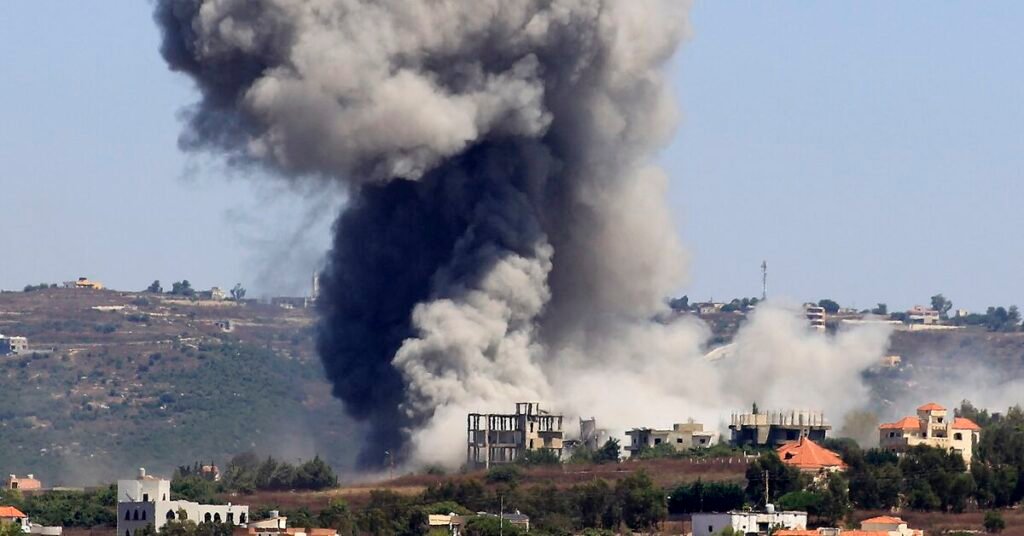Israeli airstrikes have contributed to things much worse in the Middle East in the last few days. Attacks have happened in both Lebanon and Syria. These attacks hit military bases and armed groups in both countries. They were part of Israel’s long-term plan to stop Hezbollah from gaining more power in the area. The Israeli government says that these actions are necessary for national security, but the effects are much bigger, including deaths, violations of ceasefire agreements, and a general rise in hostilities.
Attacking Hezbollah in Lebanon
On Tuesday, Israel’s military strikes in the Bekaa Valley killed at least 12 people, five of whom were Hezbollah fighters. The airstrikes were aimed at Hezbollah’s elite Radwan Force, which has been involved in planning and carrying out attacks on Israel. The goal of the operation was to stop Hezbollah from rebuilding in the area.
Israel decided on the Bekaa Valley as a key target because Hezbollah has been there in the past. Israel and a number of other countries see Hezbollah as a terrorist group because it is hostile and has ties to Iran and Syria. People think that the recent strikes are part of Israel’s larger plan to weaken Hezbollah and stop the group from getting a foothold near its borders.

The Israeli military said that the airstrikes hit Hezbollah’s military bases and training camps, which are used to train operatives and store weapons. The Israel Defence Forces (IDF) say that these facilities were a “blatant violation” of the ceasefire agreement between Lebanon and Israel that the US helped to make in November 2022. The agreement was meant to stop the fighting from becoming worse, but Israel said that Hezbollah’s actions in the Bekaa Valley were making Israeli security more and more at risk.
The death toll and civilian casualties in Lebanon
Seven of the 12 people who died in the Bekaa Valley were Syrian nationals, including a family of five. Eight people were hurt in the strikes as well. One of the airstrikes hit a camp for Syrian refugees, which made the operation even worse for civilians. The fact that displaced Syrians are included in the death toll shows how complicated the conflict is, since refugees are still the ones who are most affected by violence in the area. The Israeli military hasn’t said much more about the exact nature of the casualties, but it’s clear that the humanitarian consequences are bad.
The airstrikes are the most deadly military action by Israel in Lebanon since the ceasefire agreement in 2022. This makes people even more worried about the region’s stability and the future of Israeli-Lebanese relations.
The Israeli military is still fighting Hezbollah
Israel Katz, Israel’s Defence Minister, said that the airstrikes were a “clear message” to Hezbollah. He made it clear that Israel would use all of its power to stop Hezbollah from restoring its military. Katz stressed that Israel was determined to stop any future threats from Hezbollah’s Radwan Force, which has been behind a number of high-profile attacks on Israel in the past.
Even though there was a ceasefire agreement, Israeli airstrikes on Hezbollah operatives and infrastructure in southern Lebanon have continued on a regular basis. The ceasefire was meant to lower tensions, but Israel’s military still goes after what it sees as immediate threats, especially those connected to Hezbollah’s weapons depots and training camps. Israeli officials say that these strikes are necessary to stop possible threats before they can grow into bigger wars.
The situation in Lebanon is still unstable, and the ongoing Israeli operations show how tense the country is with Hezbollah. Israel is worried about Hezbollah’s ongoing actions and its ability to regroup and make its military stronger.
Israel Attacks on Transitional Government Forces in Syria
Israel’s airstrikes in Syria mostly hit government forces that support Syria’s transitional administration, especially in the southern province of Sweida. Syrian state media said that both military and civilian deaths had occurred. Israel is trying to weaken the Syrian government with such assaults because it sees it as a threat to stability in the region, especially because it is allied with Hezbollah and Iran.
There had been a lot of sectarian violence between Druze and Bedouin groups in the area for a few days before the strikes in Syria. Israel’s actions were reportedly meant to send a message to the transitional government, which Israel sees as hostile. Israel’s involvement in Syria is said to be a way to protect its own security, but it also shows how the region’s geopolitical competition is playing out. Israel has always gone after military infrastructure in Syria, especially places where weapons are stored and missile systems are set up.
There is a lot of tension in southern Syria right now because different armed groups are fighting each other and the Syrian government is trying to regain control of the area. Israel’s involvement in these operations shows how complicated things are in the area, where local conflicts are linked to bigger international power struggles.
Sectarian tensions and the Druze conflict
The violence in Sweida province began if the Druze minority and Bedouin groups fought. A Bedouin group kidnapped a Druze merchant, which led to retaliatory attacks and made the situation worse. Even though the Syrian government is divided along sectarian lines, it has tried to keep control of the region by sending in security forces. However, tensions are still high.
The Druze community in Syria has always supported the Assad regime, but now they don’t trust the transitional government. Some Druze leaders have asked for international protection, which shows that they don’t trust the government to keep the peace and protect the rights of minorities. These sectarian tensions make it harder for Syria to recover from years of civil war, and Israel’s participation makes the situation even more complicated.
Israel’s worries about Hezbollah’s power
Israel is still keeping an eye on Hezbollah’s actions in Syria and Lebanon because the group is becoming more powerful in the area. Hezbollah is now a key player in the Middle East because it has support from Syria and Iran and participates in conflicts in both Syria and Lebanon. Israel is especially worried about Hezbollah’s efforts to rebuild its military strength, especially because its Radwan Force is thought to be planning a large-scale invasion of northern Israel.
Even though Israel is trying to weaken Hezbollah, the group still gets help from Iran and Syria, which lets it stay strong along Israel’s borders. Israel continues to keep a close eye on Hezbollah’s activities, and the ongoing airstrikes are a direct response to this growing threat. Israel is worried that Hezbollah may be getting ready for more wars in the area because of the ongoing military activity.
Tensions in the region remain high and may grow worse
In 2022, Israel and Hezbollah agreed to a ceasefire, but things are still unstable. Israel has kept attacking Hezbollah targets even though the ceasefire has been broken many times. Even though the ceasefire was meant to stop fighting, Israel’s military says it will keep attacking any threats that Hezbollah poses. This makes people worry that a full-scale war could start up again at any time.
Israel’s recent airstrikes in Syria and Lebanon are part of a larger plan to stop possible threats before they turn into full-blown war. Israel has made it clear that it will use all of its power to protect its security interests, especially since Hezbollah and other groups in the area are getting better at fighting.
Final Statement:
The recent Israeli airstrikes in Syria and Lebanon show how tense things are in the Middle East and how complicated security issues are in the region. Israel’s military actions against Hezbollah and the Syrian government are part of a larger plan to stay on top of the military and fight off perceived threats. There is still no clear path to lasting peace in the region as long as Hezbollah keeps getting more powerful Syria stays unstable.
Israel will probably keep using targeted strikes and military interventions to keep the region stable. But the situation is still changing, and there is always the chance that things will get worse.





